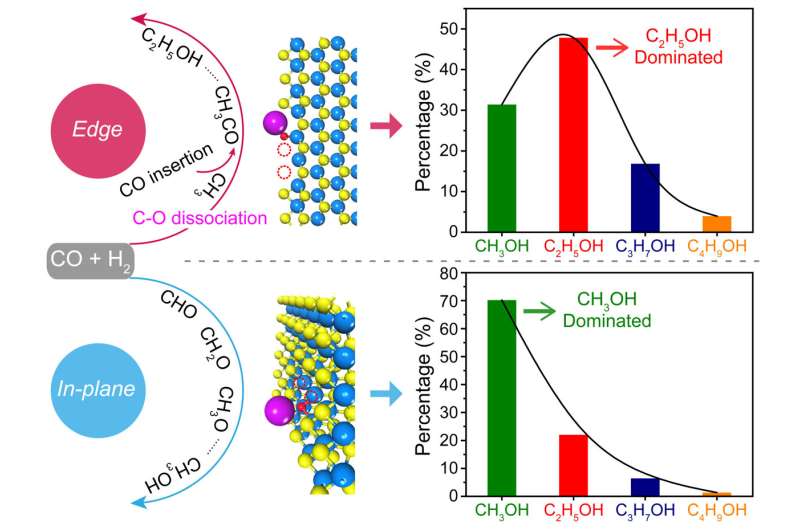This article has been reviewed according to Science X's editorial process and policies. Editors have highlighted the following attributes while ensuring the content's credibility:
fact-checked
peer-reviewed publication
trusted source
proofread
Researchers realize highly selective CO hydrogenation to higher alcohols

Selective hydrogenation of carbon monoxide (CO) to higher alcohols (C2+OH) is a promising non-petroleum route for producing high-value chemicals, in which precise regulations of both C-O cleavage and C-C coupling are essential.
Recently, a research group led by Prof. Deng Dehui and Assoc. Prof. Yu Liang from the Dalian Institute of Chemical Physics (DICP) of the Chinese Academy of Sciences (CAS), in collaboration with Prof. Wang Ye from Xiamen University, realized highly selective CO hydrogenation to C2-4OH over a potassium-modified edge-rich molybdenum disulfide (ER-MoS2-K) catalyst.
This study was published in Nature Communications on Oct. 26.
The ER-MoS2-K catalyst, assembled in nano-array morphology with uniform linear channels, was prepared on the basis of a nano channel-confined growth mechanism.
The researchers found that it could deliver a high CO conversion of 17% with a superior C2-4OH selectivity of 45.2% in hydrogenated products at 240 °C and 50 bar. Moreover, by reducing the lateral size of MoS2 to enrich edges for boosting carbon-chain growth, the researcher achieved C2-4OH to methanol selectivity ratio overturn from 0.4 to 2.2, and the selectivity of C2-4OH could reach over 99% in C2+OH products.
Sulfur vacancies (SVs) at the edge of MoS2 boosted carbon-chain growth by facilitating simultaneously the C-O cleavage of CHxO* for generating CHx* intermediate, and the subsequent C-C coupling between CO* and CHx*, while the potassium promoter promoted the desorption of alcohols via electrostatic interaction with hydroxyls, thereby enabling controllable formation of C2-4OH.
"Our work presents the high flexibility of edge SVs of MoS2 in tailoring both C-O cleavage and C-C coupling for carbon-chain growth in CO hydrogenation, thus providing a prototype for the rational design of nanostructure and microenvironment of active sites for selective hydrogenation reactions," said Prof. Deng.
More information: Jingting Hu et al, Edge-rich molybdenum disulfide tailors carbon-chain growth for selective hydrogenation of carbon monoxide to higher alcohols, Nature Communications (2023). DOI: 10.1038/s41467-023-42325-z
Journal information: Nature Communications
Provided by Chinese Academy of Sciences




















